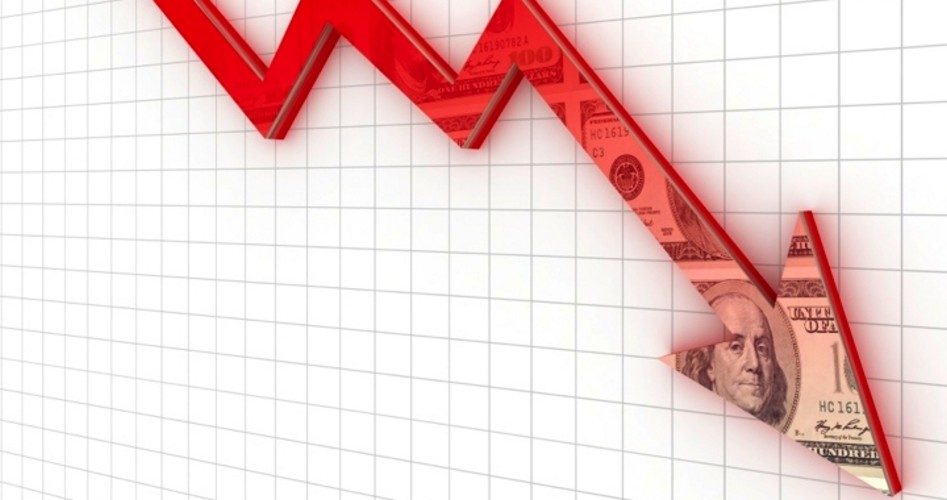
The latest report from the Cato Institute comes on top of a long and increasingly unhappy series of reports on freedom’s decline in America. Enitled the “Economic Freedom of the World” and updated with the latest data available (through 2013), the report ranks the United States in 16th position, down from second place when the index was first published in 2000. The United States has fallen behind such countries as New Zealand, the United Arab Emirates, Mauritius, Jordan, Ireland, Canada, the United Kingdom, and Chile.
Last year’s report showed the United States in 12th position.
The study measures freedom in five broad areas: the size of government, the security an individual has in his property rights, how sound his currency is, what degree of freedom he has to trade and travel internationally, and how much the government regulates his private and business transactions. Having done this for years, the authors of the Cato study note, “Virtually without exception, these studies have found that countries with institutions and policies more consistent with economic freedom have higher investment rates, more rapid economic growth, higher income levels, and a more rapid reduction in poverty rates.”
The Cato study analyzes not only per-capita GDP but individual income levels, life expectancy rates, and something called “personal life satisfaction,” which is, according to the authors, “the degree to which people feel they are in control of their lives.” Wrote the authors, “Economic freedom exerts a strong and persistent impact on both individual life control and life satisfaction … that living in a country with high overall economic freedom is a major determinant of perceived personal control over one’s life.”
Sounding like an excerpt from the Declaration of Independence, the authors concluded, “We find that living in a country with high overall economic freedom is a relevant determinant of feeling in control of one’s own life … economic freedom … influences individual happiness by giving people the feeling of being more in control of their lives and having the freedom to choose between different options in the market.”
Compare that to this: “We hold these truths to be self-evident, that all men are created equal, that they are endowed by their Creator with certain unalienable rights, that among these are Life, Liberty and the Pursuit of Happiness.”
What the Founders knew to be “self-evident” has taken a bevy of economists and statisticians at think tanks across the world to confirm. The fifth annual report from Canada’s Fraser Institute, the Human Freedom Index, shows the United States falling from 17th place to 20th in just the last year, with one of its authors calling its findings “worrisome”: “The U.S. performance is worrisome and shows that the United States can no longer claim to be the leading bastion of liberty in the world. In addition to the expansion of the regulatory state and drop in economic freedom, the war on terror, the war on drugs, and the erosion of property rights due to the greater use of eminent domain all likely have contributed to the U.S. decline.”
Unless that decline is halted, “it could cut the U.S. historic growth rate of 3% by half.”
The Heritage Foundation’s entry into the discouraging discussion, its 2015 Index of Economic Freedom, showed the United States declining from second place in 2000 to 12th place, with that decline accelerating over the past five years “reflecting the broad-based deterioration in key policy areas, particularly those related to upholding the rule of law and limited government.”
In another study published by Cato, the United States fell from 17th place worldwide to 20th, reflecting “a long-term drop in every category of economic freedom and in its rule of law.”
In a perverse expression of optimism, the authors of the Human Freedom Index study listed some of the nations that are now outperforming the United States in economic freedom: Hong Kong, Singapore, New Zealand, Switzerland, the United Arab Emirates, Mauritius, Jordan, Ireland, Canada, the United Kingdom, Australia, Georgia, Chile, Qatar, and Taiwan. Wrote the authors,
Good for them! But, honestly: Georgia, Jordan, UAE and Qatar? Just 25 years ago Georgia was the “Georgian Soviet Socialist Republic,” its people chained by the dead hand of communist central planning, coercion and corruption. On a more hopeful note, if even Georgia can throw off its chains, then surely the U.S. can unwind the damage done by 15-plus years of bad federal policies.
The continuing decline of economic and personal freedom in the United States proves the adage, “The essence of freedom is the limitation of government.” Winston Churchill put it well: “Socialism is a philosophy of failure, the creed of ignorance, and the gospel of envy. Its inherent virtue is the equal sharing of misery.”
Think tanks monitoring the decline of economic and personal freedom in the United States also reflect the success of policies set in place long ago. As Rowan Gaither, then-president of the Ford Foundation, told Norman Dodd, head of the Reese Committee, in 1954: “All of us here at the policy-making level have had experience with directives … from the White House…. The substance of them is that we shall use our grant-making power so as to alter life in the United States so that we can be comfortably merged with the Soviet Union.”
Titles may have changed over those six decades, but the substance remains. Writing in 1958, Aldous Huxley, the author of Brave New World, said this:
In 1931 … I was convinced that there was plenty of time [to implement] the completely organized society, the scientific caste system, the abolition of free will … servitude made acceptable. These things were coming, but not in my time, not even in the time of my grandchildren. Twenty-seven years later I feel a good deal less optimistic. In the West, individual men and women still enjoy a large measure of freedom. But this freedom and even the desire for this freedom seem to be on the wane.
In the nearly 60 years since those words were penned by the socialist Huxley, the U.S. government has come almost completely unmoored from its constitutional restraints and the entitlement/welfare mentality predicted by him continues to thrive. Just ask the analysts at Cato, Heritage, and Fraser who are tracking the decline. With the growth of government comes the reduction of freedom, just as Jefferson noted in his letter to Edward Carrington in 1788: “The natural progress of things is for liberty to yield, and government to gain ground.” That “natural progress” has been aided and abetted by forces and interests working to hasten the decline.
A graduate of an Ivy League school and a former investment advisor, Bob is a regular contributor to The New American magazine and blogs frequently at www.LightFromTheRight.com, primarily on economics and politics. He can be reached at [email protected].
Related article:



